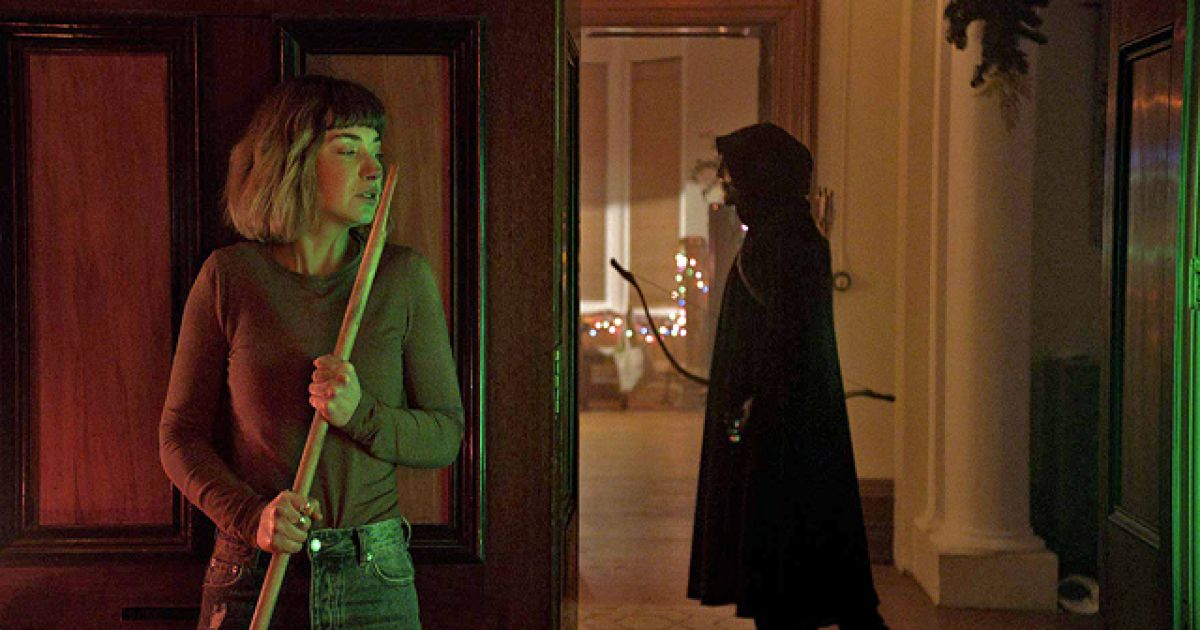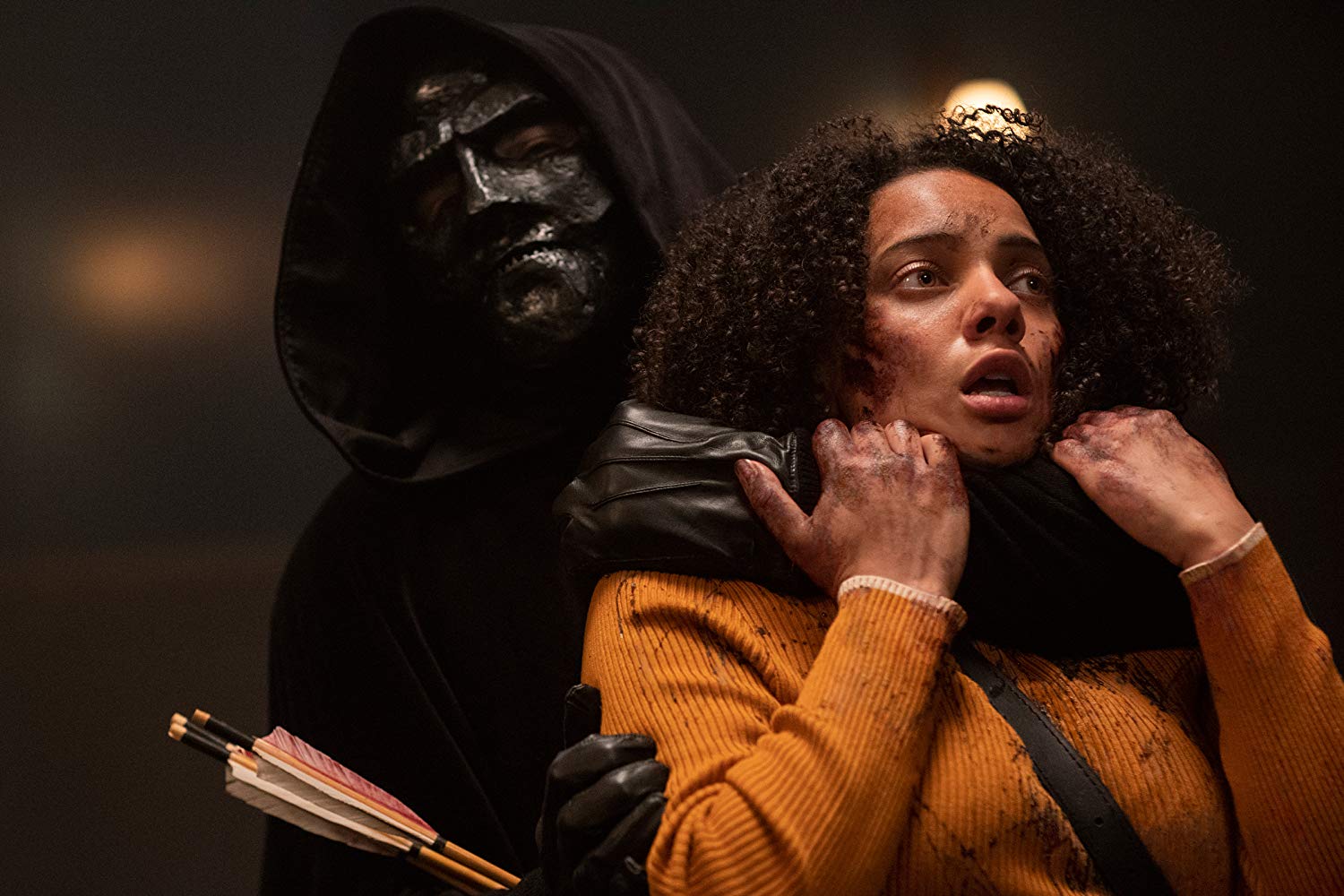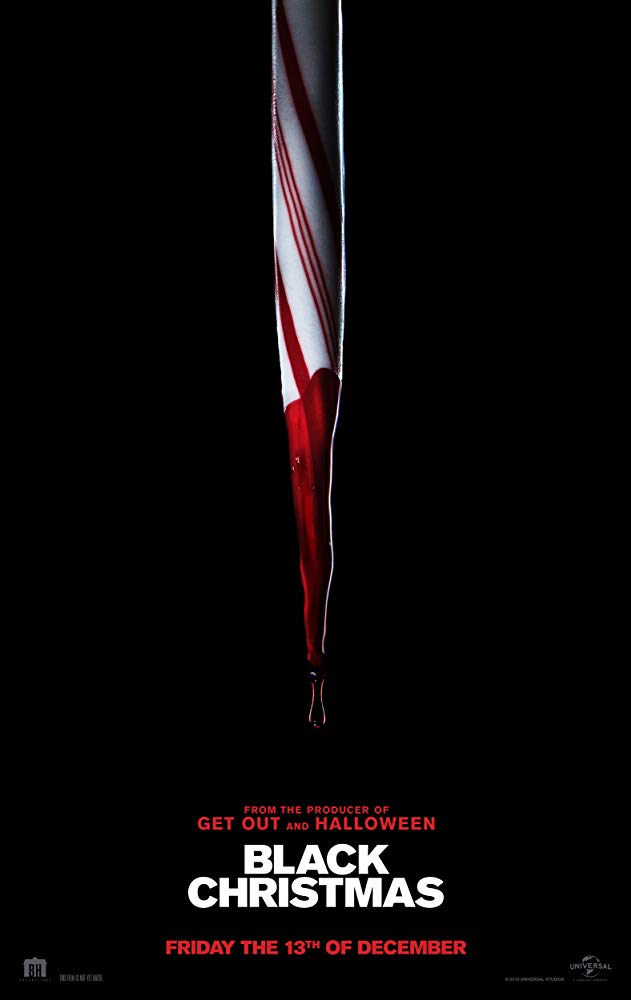USA. 2019.
Crew
Director – Sophia Takal, Screenplay – Sophia Takal & April Wolfe, Producers – Brigitte Berman, Jason Blum, Ben Cosgrove & Adam Hendricks, Photography – Mark Schwartzbard, Music – Brooke Blair & Will Blair, Visual Effects – Legion VFX (Supervisor – James David Hattin), Special Effects Supervisor – Steve Yardley, Prosthetics Supervisor – Ebony Kay, Production Design – Mark Robins. Production Company – Blumhouse Productions.
Cast
Imogen Poots (Riley Stone), Aleyse Shannon (Kris Waterson), Lily Donoghue (Marty Coolidge), Brittany O’Grady (Jesse Bolton-Sinclair), Caleb Eberhardt (Landon), Cary Elwes (Professor Gelson), Simon Mead (Nate), Madeline Adams (Helena Rittenhouse), Mark Neilson (Gil), Nathalie Morris (Fran Abrams), Ryan McIntyre (Brian Huntley), Lucy Curry (Lindsay Helms)
Plot
It is a few days before Christmas at Hawthorne College. Riley Stone is among several of the girls at the Mu Kappa Epsilon sorority house who has not left to go home yet. Riley is still emotionally raw over being date raped by Brian Huntley of the AKO fraternity house and that nobody in authority took her seriously. She and several of her sorority sisters take the opportunity of a Christmas revue at the AKO house to perform a song number protesting this. Several of the girls in the Mu Kappa house start receiving threatening private messages supposedly from college founder Calvin Hawthorne and then go missing. Riley tries to find who on campus is killing the girls.
Black Christmas (1974) is often cited as the very first slasher film. A clever and witty effort from Bob Clark, it depicts the various girls of a sorority house being stalked by a killer who eventually appears to be hiding inside the building. It laid down many of the tropes that would subsequently become an integral part of the slasher film. This was duly remade by Glen Morgan as Black Christmas (2006), which placed much more of an emphasis on gore.
This is a further remake that comes from under the aegis of Jason Blum and his Blumhouse company. Blumhouse had been extremely active on the genre scene throughout the 2010s with the likes of Paranormal Activity (2007), Insidious (2010), The Purge (2013) and sequels, plus a good many others. (See below for Blumhouse’s other films).
Blumhouse have also been one of the production companies who have readily leapt aboard the sea change that has occurred in film and tv since late 2017 and embraced Woke sensitivities. With Black Christmas, it was announced that Sophia Takal would be Blumhouse’s first female director. (Some sites have made the claim that Black Christmas was an all-girl made film but a simple look at the credits above renders this untrue). Takal had previously directed the non-genre Green (2011) and the horror film Always Shine (2016). She also has a number of credits as an actress, including the role of the wife in Ti West’s Second Honeymoon segment of V/H/S (2012).
Black Christmas is a film with a very strong and ardent feminist agenda. It features quotes from Camilla Paglia and Sophia Takal apparently sought to have a cameo from Gloria Steinem. The women portrayed in the film are extremely vocal about their viewpoints. They sing song and dance numbers about campus rape culture. There is a scene where Imogen Poots rescues a girl who seems to be under the influence from having non-consenting sex with a jock. There are several scenes where we learn that Imogen Poots’ own rape complaint was not taken seriously by campus police. We have scenes trying to ban a professor from campus for not being diverse enough. We also learn that the statue of the college founder was removed because he kept slaves.

I would go so far as to say that Black Christmas is a horror film not really interested in being a horror film; it is a horror film that wants to stand on a political soapbox and lecture an audience about issues. Although, I am not even sure it is a film that allows me to have an opinion about it doing so. As a male, I feel exactly like the character played by Simon Mead in the film who protests “Why are you allowed to say all this shit about men and we’re supposed to just sit here and take it?” who is promptly drowned out in a loud outcry of invective and then driven out of the sorority house. If your political outlook is the same as the sorority sisters in the film that want to shut out any contrary opinions then I’d advise to stop reading this now.
The reality is that I agree with much of what Sophia Takal has to address in the film – that men have a habit of not treating women well, that there is an endemic problem with so-called campus rape culture in the US, that ingrained systems of power have systematically shut women out from inclusion. The main difference might be that Sophia Takal seems to want to shout the message from a loud hailer and call for the literal burning down of the patriarchy; I am more of a moderate on the issues and prefer to ask what can be done to rectify the situation here and now.
Furthermore, in that I am a member of the same group (white males) that are being shouted at and blamed for all the problems of women in the film then my reaction on a personal level cannot help but be one of antagonism towards the message. All of the guys in the film are portrayed as either insensitive jerks or downright creepy with the exception of Caleb Eberhardt who is portrayed as an ineffectual fumbling nice guy – even then he is placed under the mind control of the black ichor and becomes just like all the others in the secret society of mind-controlled men.
[PLOT SPOILERS] In the end, we learn that the men on campus are part of a patriarchal conspiracy – quite what the conspiracy is about is not that clear, something to do with a black ichor that emerges from the removed head of a statue of the university’s founder and causes the men in the secret society to become mind controlled zombies able to be directed to attack the girls. This is where the film’s politics get messy – is the film saying that it takes some outside form of mind control for men to become like this, or does it want to attack men for their attitudes, which Takal seems to more than want to do. Also an ending which burns the fraternity house down while leaving the men (who are just dupes being mind controlled) locked inside seems a little extreme.

In fact, I started to switch off the film far earlier in the show at about the point that Aleyse Shannon is soliciting signatures for a petition to have professor Cary Elwes removed because his course is not diverse enough. It is not clear if Sophia Tikal actually agrees with this view of academic censorship or not but in that Elwes is played as a snivelly in his attempts to apologise for his views and later shown as the leader of the secret brotherhood of men, then you can take it that she probably does. Let it be clear I am entirely opposed to viewpoints that say academics be silenced on any grounds. (The solution seems to me a bindingly obvious one – in that most academic courses are elective in nature, why not teach one on Western Classics and a parallel course on Other/Neglected Voices?). To me, the idea that those teaching about works of cultural canon should have their voices erased because they do not meet the criteria of a contemporary moral crusade is an abhorrent one.
I also have a problem with the relentless damning of half the human race that the film wants to indulge in. It becomes a point-of-view that is extreme – where, just like Simon Mead, any contrary voices are shouted down and then shut out, or in the case of Madeline Adams are angrily denounced as collaborators. This is an angry and misandrist screed. It is a film that wants you to agree with one point-of-view only and has no time for anybody who does not. I don’t begrudge Sophia Takal and April Wolfe their viewpoint – and certainly don’t wish to silence them – but as most ardent protestors find if a message is relentlessly shouted at you through a megaphone, people tire and switch off. I don’t go to horror films to be lectured at.
The shame about Black Christmas is that when it does bother to engage on the level when we thought we had come in the door, there are some undeniable scenes where the slasher movie tactics start to kick in – the opening with Lucy Curry being stabbed by an icicle, the scene borrowed from The Exorcist III (1990) where the hooded figure abruptly appears from the left of frame and attacks Nathalie Morris. But it feels pointless to even try and talk about Black Christmas as a horror film because it isn’t a horror film, it is a slasher movie that makes occasional nods to its source but where anything beyond that has been hijacked by a political agenda.
Jason Blum and his Blumhouse production company have produced a number of other genre films including:- Hamlet (2000), Paranormal Activity (2007) and sequels, Insidious (2010) and sequels, Tooth Fairy (2010), The Bay (2012), The Lords of Salem (2012), The River (tv series, 2012), Sinister (2012) and sequel, Dark Skies (2013), Oculus (2013), The Purge (2013) and sequels, the tv mini-series Ascension (2014), Creep (2014), Jessabelle (2014), Mercy (2014), Mockingbird (2014), Not Safe for Work (2014), Ouija (2014) and sequel, 13 Sins (2014), The Town That Dreaded Sundown (2014), Unfriended/Cybernatural (2014), Area 51 (2015), The Boy Next Door (2015), Curve (2015), The Gallows (2015), The Gift (2015), Jem and the Holograms (2015), The Lazarus Effect (2015), Martyrs (2015), Visions (2015), The Visit (2015), The Darkness (2016), Incarnate (2016), The Veil (2016), Viral (2016), Amityville: The Awakening (2017), Get Out (2017), Happy Death Day (2017), The Keeping Hours (2017), Split (2017), Stephanie (2017), Bloodline (2018), Cam (2018), Delirium (2018), Family Blood (2018), Halloween (2018), Seven in Heaven (2018), Truth or Dare (2018), Upgrade (2018), Ma (2019), Prey (2019), Don’t Let Go (2019), Sweetheart (2019), Black Box (2020), The Craft: Legacy (2020), Evil Eye (2020), Fantasy Island (2020), Freaky (2020), The Hunt (2020), The Invisible Man (2020), Nocturne (2020), You Should Have Left (2020), Black As Night (2021), The Black Phone (2021), Dashcam (2021), Firestarter (2022), M3gan (2022), Mr Harrigan’s Phone (2022), Nanny (2022), Soft & Quiet (2022), Run Sweetheart Run (2022), Sick (2022), They/Them (2022), Torn Hearts (2022), The Visitor (2022), Unhuman (2022), The Exorcist: Believer (2023), Five Nights at Freddy’s (2023), There’s Something Wrong With the Children (2023), Totally Killer (2023), Unseen (2023), Afraid (2024), Imaginary (2024), Night Swim (2024), Speak No Evil (2024), Wolf Man (2025) and The Woman in the Yard (2025).
(Winner in this site’s Worst Films of 2019 list).
Trailer here


